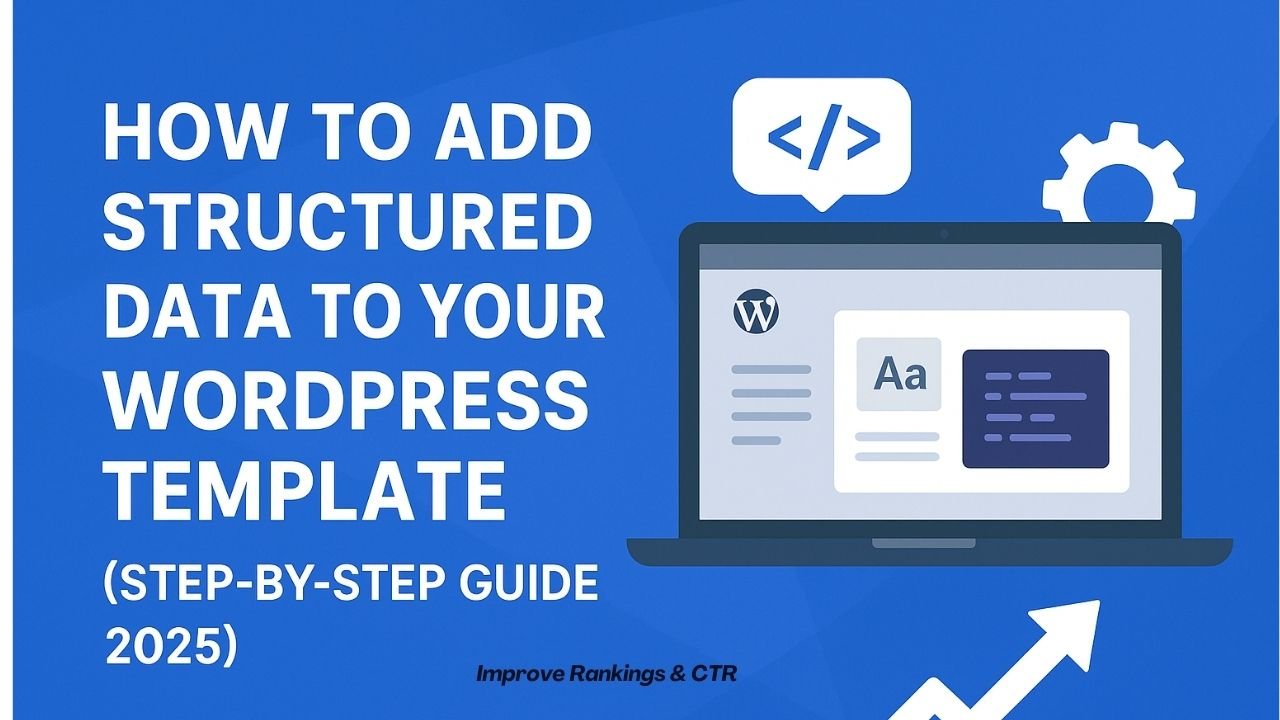How to Insert Structured Data In Markup to Your WordPress Template
Introduction
If you want your WordPress website to rank higher on Google and have your website appear with enhanced rich snippets in search, one of the many pieces of the puzzle is to insert structured data markup into your WordPress template. Structured data markup (or schema markup) is helpful when search engines better understand your content, and ultimately allow your content to be shown with additional data in the form of star ratings, FAQs, recipe ratings, reviews, event details, and all sorts of other information.
This guide will give you a step-by-step explanation of how to add structured data-markup to your WordPress template in 2025, what tools you can use to assist you, and how adding structured data to your WordPress website can assist your SEO ranking and click-through rate (CTR).
What is Structured Data within the WordPress platform?
Structured data is a code format (usually JSON-LD) which allows your content to be machine-readable to search engines. When you place structured data in a WordPress template Google can render search results separately, or as an enhancement to those results, in the following ways:
- ⭐ Star ratings for services, products, or reviews
- 📅 Events to be shown in search results
- ❓ Frequently asked questions directly below the link
- 🍴 Cooking recipes with cooking time etc.
👉 By adding structured data in your template you would make the appearance of your site in the search results look enticing, which lends itself directly to improved SEO performance.
Why Add Structured Data to Your WordPress Template in 2025?
In 2025, there will be a continued importance to opting for structured data for Google to rely on search intent and user experience.
Benefits:
- 📈 Google ranks things better because of schema markup
- 🚀 Click through rates (CTR) from rich snippets. It stands out A LOT.
- 📱 Mobile friendly because of better display
- 🛍 E-commerce sites outperform because of more clicks to products with ratings/pricing
Structured data enhances your site will improvements in SEO. Adding structured data to your WordPress template offers peace of mind for future changes in SEO.
Options for Adding Structured Data to Your WordPress Template
There are two methods in which you can add structured data to WordPress templates:
1. Adding Structured Data with a WordPress plugin
Using a plugin is by far the easiest way to add structured data, especially for new users.
Best Structured Data Plugins in 2025:
- Rank Math SEO – Built-in schema creator
- Yoast SEO – Auto schema for articles, products, and breadcrumbs
- Schema Pro – Customize structured data with advanced options
- WP SEO Structured Data Schema – Lightweight and powerful
Steps to use a plugin:
- Download and activate your desired plugin
- Go to schema settings inside your plugin dashboard
- Choose schema type (Article, FAQ, Product, Review, Event etc.)
- Fill in all requested information
- Save and test using Google's Rich Results Test
2. Adding Structured Data Manually to your WordPress Template gin
If you are a developer or advanced user, you could directly add structured data to WordPress templates using JSON-LD code.
Steps:
- Go to your theme folder → single.php, header.php, or footer.php (depending on schema type).
- Insert your JSON-LD schema code inside <script type=”application/ld+json”> … </script>.
Example code for an article:
<script type=”application/ld+json”>
{
“@context”: “https://schema.org”,
“@type”: “Article”,
“headline”: “How to Add Structured Data to Your WordPress Template”,
“author”: {
“@type”: “Person”,
“name”: “Your Name”
},
“publisher”: {
“@type”: “Organization”,
“name”: “Your Website”,
“logo”: {
“@type”: “ImageObject”,
“url”: “https://yourwebsite.com/logo.png”
}
},
“datePublished”: “2025-01-01”,
“dateModified”: “2025-01-01”
}
</script>
- Save and upload your template.
- Test the changes in Google’s Structured Data Testing Tool or Rich Results Tes
Best Practices for Implementing Structured Data in WordPress Templates
If you would like to add structured data to WordPress templates, consider these best practices for getting your structured data to work:
- ✅ We recommend JSON-LD (and so does Google).
- ✅ Always validate your schema with Rich Results Test before providing the correct URL to Google.
- ✅ Only markup schema that is relevant (do not spam schema).
- ✅ Keep your schema up to date with the latest Google schema details and practices.
- ✅ Using plugins are okay if you do not feel comfortable editing code.
Testing Structured Data in WordPress
Whenever you add any structured data to the WordPress templates, always test the structured data.
- In 2025 you have options for tools:
- Google Rich Results Test
- Schema.org Validator
- Chrome Extensions (like Structured Data Testing Tool)
If you follow these, you will have the best SEO results anytime you add structured data to WordPress templates.
What Not to Do
When you add structured data to WordPress templates, do not:
- ❌ Use duplicate schema types you do not need!
- ❌ Forget to validate your schema with testing tools!
- ❌ Add schema that is irrelevant to just for SEO value
- ❌ have multiple plugins overlapping your schema.
Different types of mistakes can cause Google to ignore your structured data schema markup; you might even be penalizing your site!
final Thoughts
One of the most efficient ways to improve your SEO is to implement schema markup. By incorporating structured data into your WordPress templates, you will help search engines better understand your content and present your listings in a more visually engaging way for users.
In all reasonable likelihood, by 2025, you will be able to implement structured data directly with plugins like Rank Math, Yoast SEO, and Schema Pro. But for the more technically minded, you can create a JSON-LD schema by manually inserting it into your template, giving you full control over your schema markup implementation.
👉 Start now, test your found results and enjoy better positions, click-through rates and overall SEO performance by adding structured data into your WordPress template.
.

Monetising WordPress Themes & Plugins: Licence Models, Free-vs-Pro Strategy & Affiliate Marketing
Read More »
Theme Security Best Practices: Protecting Your Users and Building a Trusted Brand (2025 Edition)
Read More »





Leave a Reply